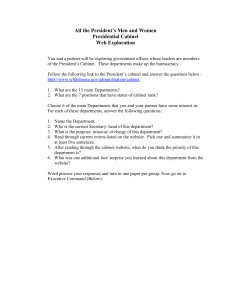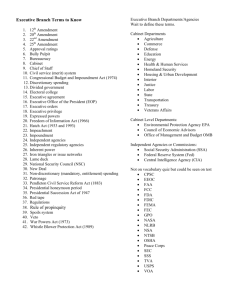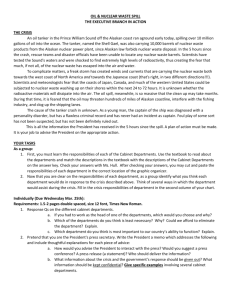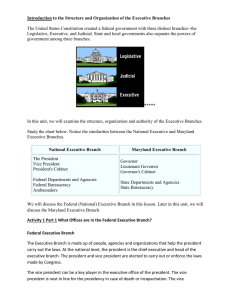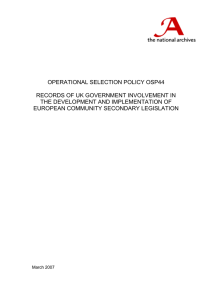Federal Agencies
advertisement
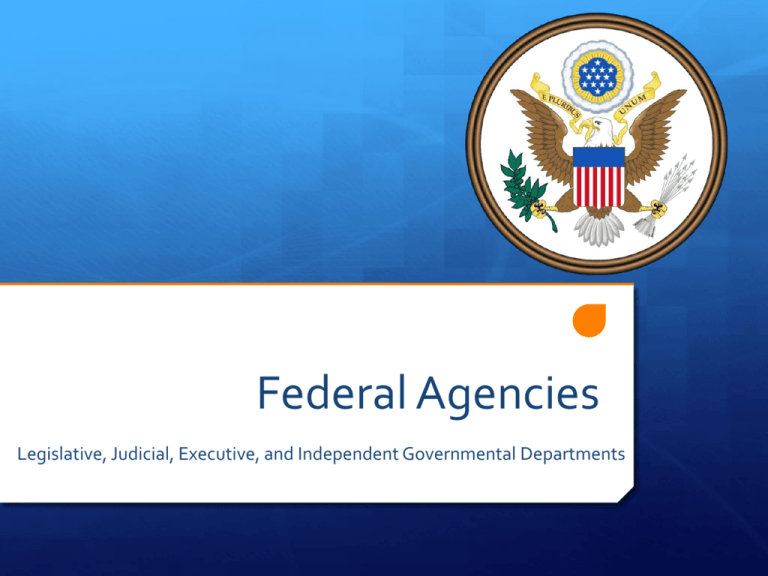
Federal Agencies Legislative, Judicial, Executive, and Independent Governmental Departments Legislative Branch Important Agencies and Offices within the Legislative Branch Library of Congress United States Copyright Office United States Capitol Police Judicial Branch Important Agencies and Offices within the Judicial Branch: Federal Judicial Center Office of Probation and Pretrial Services United States Sentencing Commission Executive Departments The Executive Departments make up the President’s Cabinet and are part of the order of succession as created by the 25th Amendment. The original three were the Departments of State, War, and the Treasury. 15 Total Departments United States Department of Agriculture Also known as the USDA Is responsible for developing and executing the policy on farming, agriculture, forestry, and food. Major Agencies within the USDA: Food Safety and Inspection Service Forest Service 4-H United States Department of Commerce Is most concerned with promoting Economic Growth. Promotes job creation and improved living standards for all Americans. Important Agencies: Census Bureau National Oceanic and Atmospheric Administration Patent and Trademark Office United States Department of Defense In charge of all agencies and functions of the Armed Forces. This department is the largest employer in the world Important Agencies: Army, Navy (Marines), Air Force, National Guard Joint Chiefs of Staff National Security Agency (NSA) Pentagon West Point Military Academy United States Department of Education Smallest of all the cabinet agencies with about 5,000 total employees. Created in 1868, but not cabinet level until 1979 Establishes policy for administering education, collects data on schools, and enforces education laws. Major Agencies: Office for Civil Rights Office of Federal Student Aid United States Department of Energy Concerned with policy regarding energy and safety in handling nuclear material. Responsible for the nuclear weapons program. (Nuclear Weapons are secured by the Navy) Supports physical science more than any other US Department. United States Department of Health and Human Services Goal of protecting the health of all Americans. Motto is “Improving the health, safety, and well-being of America”. Was originally combined with the Department of Education. Major Agencies: Centers for Disease Control and Prevention (CDC) Food and Drug Administration (FDA) Public Health Service United States Department of Homeland Security The newest cabinet department. Formed after 9/11 Primary responsibility is protecting the US and its territories from and responding to terror, man-made accidents, and natural disasters. Important Agencies: Federal Emergency Management Agency (FEMA) United States Coast Guard Transportation Security Administration (TSA) US Border Patrol US Immigration and Customs Enforcement Secret Service United States Department of Housing and Urban Development (HUD) Founded in 1965 as part of Lydon Johnson’s Great Society Program. The mission is to create strong, sustainable communities, with quality affordable housing. Important Agencies: Federal Housing Administration Federal Housing Finance Agency Equal Employment Opportunity United States Department of the Interior Responsible for the management of federal land and natural resources. Important Agencies: Fish and Wildlife Service National Park Service United States Geological Survey United States Department of Justice Responsible for the enforcement of law and administration of justice. Department is led by the Attorney General. Important Agencies: Bureau of Alcohol, Tobacco, Firearms, and Explosives (ATF) Drug Enforcement Administration (DEA) Federal Bureau of Investigation (FBI) Federal Bureau of Prisons/National Institute of Corrections United States Marshals United States Parole Commission United States Department of Labor Responsible for occupational safety, wage and hour standards, unemployment insurance benefits, reemployment services, and economic statistics. United States Department of State The first established executive department Led by the Secretary of State Operates diplomatic missions of the US abroad and is responsible for implementing foreign policy. United States Department of Transportation (DOT) Concerned with transportation. “Ensuing a fast, safe, efficient, accessible, and convenient transportation system that meets our vital national interests and enhances the quality of life of the American people, today and into the future.” Important Agencies: Federal Aviation Administration (FAA) Federal Highway Administration United States Department of the Treasury Prints and mints all paper currency and coins in circulation. Collects all federal taxes. Manages all government debt. Important Agencies: Internal Revenue Service (IRS) United States Mint United States Department of Veterans Affairs Runs the military veteran benefit system. In charge of the VA Hospitals. Independent Government Agencies Not all Government agencies are found in one of the three branches, some of the most important are: Federal Trade Commission Consumer Product Safety Commission National Aeronautics and Space Administration (NASA) National Science Foundation Tennessee Valley Authority (TVA) Environmental Protection Agency (EPA) Federal Deposit Insurance Corporation (FDIC) United States Postal Service (USPS) Central Intelligence Agency (CIA)
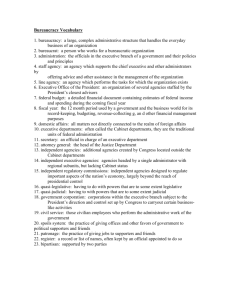
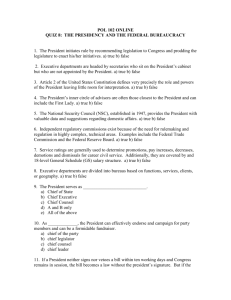
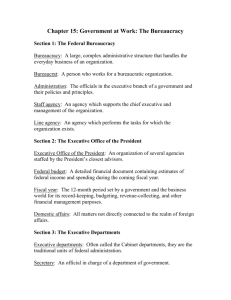
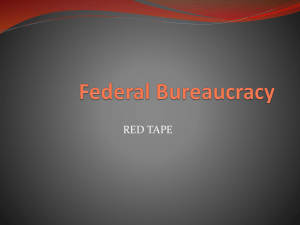
![The ABCD”s of Government[1] 2](http://s3.studylib.net/store/data/009082142_1-109c57ca271776bb7784549a1bc2e993-300x300.png)
